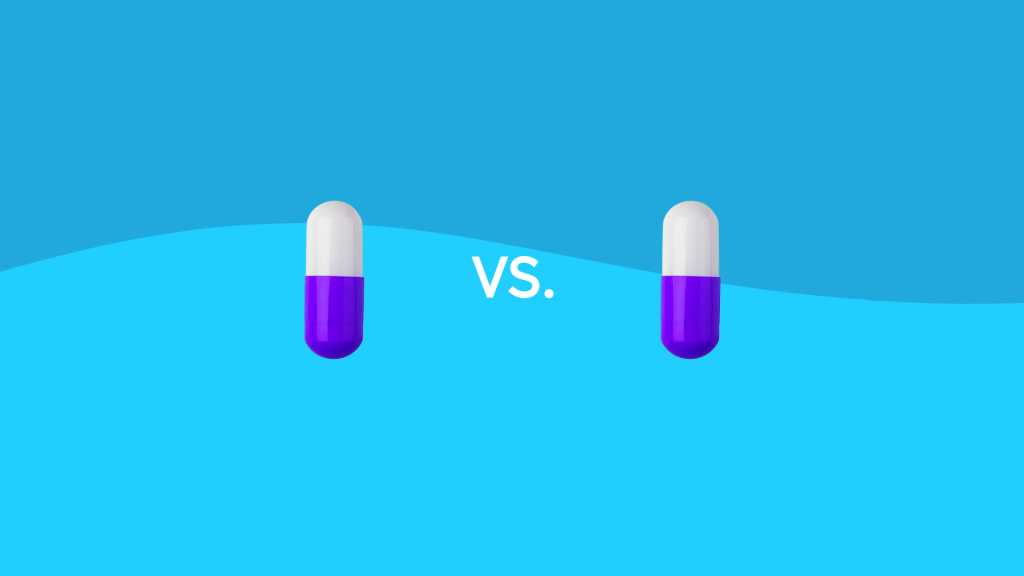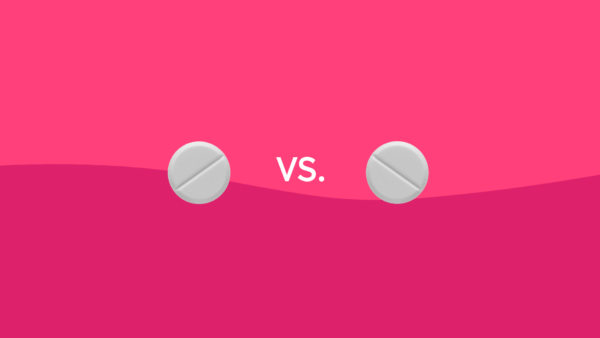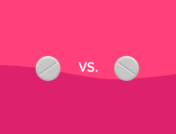Drug overview & main differences | Conditions treated | Efficacy | Insurance coverage and cost comparison | Side effects | Drug interactions | Warnings | FAQ
If you or a loved one experience depression, anxiety, or other conditions that affect mental health, you are not alone. More than 16 million American adults have major depressive disorder (also called MDD, or depression), and nearly 7 million adults have generalized anxiety disorder (GAD).
Cymbalta (duloxetine) and Prozac (fluoxetine) are two popular antidepressant medications prescribed for depression and several other conditions. Both prescription drugs are approved by the United States Food and Drug Administration (FDA). Medication use with Cymbalta or Prozac is often combined with psychotherapy with a psychologist or doctor of psychiatry.
Cymbalta is classified in a group of medications called SNRIs (serotonin-norepinephrine reuptake inhibitors). They work by increasing the levels of serotonin and norepinephrine in the brain.
Prozac is part of a group of drugs called SSRIs (selective serotonin reuptake inhibitors). SSRIs work by increasing levels of serotonin in the brain.
What are the main differences between Cymbalta and Prozac?
Cymbalta (duloxetine) is an SNRI medication. It is available in both brand and generic. Cymbalta is only available in capsule form. The dosage varies, but a typical dose is 60 mg per day. Cymbalta is used in adults but may be used in younger ages for certain conditions (see chart).
Prozac (fluoxetine) is an SSRI medication. It is available in both brand and generic. Prozac is available in tablet form, capsule form, and as an oral solution. Although the dosage varies, a typical dose is 20 mg once a day. Prozac may be used in adults for all of the indications listed in the chart below. Prozac can also be used in children over 8 years old for depression or over 7 years old for OCD.
| Main differences between Cymbalta and Prozac | ||
|---|---|---|
| Cymbalta | Prozac | |
| Drug class | Serotonin-norepinephrine reuptake inhibitor (SNRI) | Selective serotonin reuptake inhibitor (SSRI) |
| Brand/generic status | Brand and generic | Brand and generic |
| What is the generic name? | Duloxetine | Fluoxetine |
| What form(s) does the drug come in? | Capsules | Tablet, capsule, oral solution; also available in combination with olanzapine as Symbyax |
| What is the standard dosage? | Example: 60 mg once daily (dosage varies) | Example: 20 mg once daily (dosage varies) |
| How long is the typical treatment? | Varies | Varies |
| Who typically uses the medication? | Adults and children and adolescents 7 years and older for generalized anxiety disorder or 13 years and older for fibromyalgia | Adults and children & adolescents for depression (over 8 years old) or OCD (over 7 years old) |
Conditions treated by Cymbalta and Prozac
Cymbalta is indicated for major depressive disorder, diabetic peripheral neuropathic pain, and chronic musculoskeletal pain in adults. It can also be used for generalized anxiety disorder in adults as well as children ages 7 years and older and for fibromyalgia in adults and adolescents 13 years and older. Cymbalta is not approved for use in children for depression, diabetic peripheral neuropathic pain, or chronic musculoskeletal pain.
Prozac is indicated for major depression and obsessive-compulsive disorder (OCD) in children, adolescents, and adults. Prozac can also treat bulimia nervosa, premenstrual dysphoric disorder, and panic disorder. Prozac is not approved for use in children under 7 years old.
Note: Symbyax is a combination drug that contains fluoxetine, the ingredient in Prozac, along with another medication called olanzapine. Symbyax can treat depressive episodes associated with bipolar I disorder or treatment-resistant depression.
Sometimes doctors prescribe these drugs off-label for other uses than what they are indicated.
| Condition | Cymbalta | Prozac |
| Major depressive disorder | Yes | Yes |
| Generalized anxiety disorder | Yes | Off-label |
| Diabetic peripheral neuropathic pain | Yes | Off-label |
| Fibromyalgia | Yes | Off-label |
| Chronic musculoskeletal pain | Yes | Off-label |
| Obsessive-compulsive disorder (OCD) | Off-label | Yes |
| Bulimia nervosa | No | Yes |
| Panic disorder | Off-label | Yes |
| Premenstrual dysphoric disorder | Off-label | Yes |
| In combination with olanzapine (as Symbyax) to treat depressive episodes associated with bipolar disorder OR for treatment-resistant depression | No | Yes |
| Management of anxiety disorders | Yes | Yes |
Is Cymbalta or Prozac more effective?
One study reviewed many studies comparing Cymbalta, Prozac, and another medication called Effexor, to placebo. Cymbalta and Prozac were found to be similar in efficacy and safety for patients with depression.
The diagnosis is an essential factor in deciding which medication will be more appropriate. For example, if the indication is depression, either Prozac or Cymbalta may be an appropriate option. However, if the diagnosis is OCD, Prozac is more appropriate because it is indicated to treat OCD while Cymbalta is not. And if the diagnosis is fibromyalgia, Cymbalta is more appropriate because it is indicated for fibromyalgia, while Prozac is not.
Your healthcare provider can determine which drug is more appropriate for you, taking into account your diagnosis, medical history, and other medical conditions, along with any medications you take that could interact with Cymbalta or Prozac.
Coverage and cost comparison of Cymbalta vs. Prozac
Most insurance and Medicare Part D prescription plans cover Cymbalta or Prozac—choosing the generic form will result in significant cost savings. The brand-name products have a much higher copay or may not be covered at all.
The out-of-pocket cost of Cymbalta is about $126 for 30, 60 mg generic capsules. A free SingleCare card will help you save money on generic Cymbalta, bringing the price down to as low as $15.
The out-of-pocket cost for Prozac is about $21 for #30, 20 mg generic capsules. You can save money on generic Prozac with a SingleCare card, which can bring the generic price down to approximately $4.
Contact your insurance plan for up-to-date coverage information on Cymbalta or Prozac.
| Cymbalta | Prozac | |
| Typically covered by insurance? | Yes (generic) | Yes (generic) |
| Typically covered by Medicare Part D? | Yes (generic) | Yes (generic) |
| Quantity | 30, 60 mg capsules | 30, 20 mg capsules |
| Typical Medicare copay | $0-$20 | $0-$20 |
| SingleCare cost | $15+ | $4-$20 |
Common side effects of Cymbalta vs. Prozac
The most common side effects of Cymbalta are nausea, headaches, sleepiness, appetite loss, constipation, dry mouth, and dizziness.
The most common side effects of Prozac are headache, nausea, drowsiness, insomnia, appetite loss, sexual side effects, and nervousness or anxiety.
When you fill or refill your Cymbalta or Prozac prescription, you will receive a medication guide that discusses side effects, warnings, and other important information about your medication.
This is not a full list of adverse effects. Other, serious side effects may occur. Consult your healthcare provider for a complete list of side effects.
| Cymbalta | Prozac | |||
| Side effect | Applicable? | Frequency | Applicable? | Frequency |
| Headaches | Yes | 14% | Yes | 21% |
| Nausea | Yes | 23% | Yes | 21% |
| Drowsiness/sleepiness | Yes | 9% | Yes | 13% |
| Diarrhea | Yes | 9% | Yes | 12% |
| Constipation | Yes | 9% | Yes | 5% |
| Dry mouth | Yes | 13% | Yes | 10% |
| Ejaculation disorder/sexual dysfunction | Yes | 2-4% | Yes | % not reported |
| Insomnia | Yes | 9% | Yes | 16% |
| Dizziness | Yes | 9% | Yes | 9% |
| Appetite loss | Yes | 7% | Yes | 11% |
| Nervousness/anxiety | Yes | 3% | Yes | 13% |
Source: DailyMed (Cymbalta), DailyMed (Prozac)
Drug interactions of Cymbalta vs. Prozac
MAO inhibitor (MAOI, or monoamine oxidase inhibitor) medications should not be used while taking Cymbalta or Prozac, or for a period of time before or after taking Cymbalta or Prozac. The combination may increase the risk of serotonin syndrome, a life-threatening medical emergency due to excess serotonin. Triptans, which are migraine medications, such as Imitrex (sumatriptan), and other antidepressants, should not be used in combination with Cymbalta or Prozac due to the risk of serotonin syndrome. Also, the cough suppressant dextromethorphan, found in Robitussin-DM and many cough and cold products, should be avoided as it can also cause serotonin syndrome when combined with Cymbalta or Prozac.
Avoid alcohol when taking Cymbalta or Prozac.
This is not a full list of drug interactions. Consult your healthcare provider for a complete list of drug interactions. Tell your doctor about all the medications you take, including prescription, over-the-counter (OTC), and vitamins.
| Drug | Drug class | Cymbalta | Prozac |
| Rasagiline Selegiline Tranylcypromine |
MAOIs | Yes | Yes |
| Alcohol | Alcohol | Yes | Yes |
| Rizatriptan Sumatriptan Zolmitriptan |
Triptans | Yes | Yes |
| St. John’s Wort | Supplement | Yes | Yes |
| Warfarin | Anticoagulant | Yes | Yes |
| Codeine Hydrocodone Hydromorphone Methadone Morphine Oxycodone Tramadol |
Opioid pain relievers | Yes | Yes |
| Dextromethorphan (in many cough and cold products) | Cough suppressant | Yes | Yes |
| Azithromycin Clarithromycin Erythromycin |
Macrolide antibiotics | No | Yes |
| Aspirin Ibuprofen Meloxicam Nabumetone Naproxen |
NSAIDs | Yes | Yes |
| Citalopram Escitalopram Fluoxetine Fluvoxamine Paroxetine Sertraline |
SSRI antidepressants | Yes | Yes |
| Desvenlafaxine Duloxetine Venlafaxine |
SNRI antidepressants | Yes | Yes |
| Amitriptyline Desipramine Imipramine Nortriptyline |
Tricyclic antidepressants | Yes | Yes |
| Baclofen Carisoprodol Cyclobenzaprine Metaxalone |
Muscle relaxants | Yes | Yes |
| Carbamazepine Divalproex sodium/valproic acid Gabapentin Lamotrigine Levetiracetam Phenobarbital Phenytoin Pregabalin Topiramate |
Anticonvulsants | Yes | Yes |
| Flecainide Propafenone Thioridazine Vinblastine |
Drugs metabolized by enzyme CYP2D6 | Yes | Yes |
| Alprazolam Clonazepam Diazepam Lorazepam |
Benzodiazepines | Yes | Yes |
Warnings of Cymbalta and Prozac
Antidepressants, including Cymbalta and Prozac, have a black box warning of suicidality. A black box warning is the strongest warning required by the FDA. Children, adolescents, and young adults (up to 24 years old) taking antidepressants are at an increased risk of suicidal thoughts and behavior. Anyone who takes antidepressants should be carefully monitored.
Other warnings:
- Serotonin syndrome is a life-threatening emergency caused by too much serotonin. Patients taking Cymbalta or Prozac should be monitored for serotonin syndrome signs and symptoms, such as hallucinations, seizures, heart rhythm or blood pressure changes (such as high blood pressure), and agitation. Seek emergency medical treatment if any of these symptoms occur. Taking other drugs that increase serotonin levels (triptans, tricyclic antidepressants, fentanyl, lithium, tramadol, tryptophan, buspirone, dextromethorphan, amphetamines, St. John’s Wort, and MAOIs) increase the risk of serotonin syndrome.
- When discontinuing Cymbalta or Prozac, withdrawal symptoms such as agitation may occur. Your healthcare provider can advise you on the best way to discontinue Cymbalta or Prozac, with a slow taper schedule. Never stop Cymbalta or Prozac abruptly.
- Use with caution in patients who have seizures or who have bipolar disorder.
- Hyponatremia (low sodium) due to the syndrome of inappropriate antidiuretic hormone secretion (SIADH) may occur and can be severe. Symptoms may include headache, difficulty concentrating, memory impairment, confusion, weakness, and unsteadiness, which may lead to falls. Seek emergency treatment and stop Cymbalta or Prozac if symptoms occur.
- Avoid SSRIs in patients with untreated anatomically narrow angles (angle-closure glaucoma).
- SSRIs may increase bleeding risk—this risk increases with concomitant use of aspirin, NSAIDs, or warfarin.
- Do not drive or operate machinery until you know how Cymbalta or Prozac affects you.
- Use with caution in patients with kidney problems.
- Cymbalta or Prozac may alter blood sugar levels in patients with diabetes. This requires monitoring and may require dosage adjustment to diabetes medications.
- Cymbalta or Prozac may cause weight changes. Cymbalta may cause weight gain or loss, while Prozac may cause weight loss. Monitor weight during treatment with Cymbalta or Prozac.
- Cymbalta or Prozac should only be used in pregnancy if the benefit to the mother is greater than the risk to the baby. Stopping the medication may cause a relapse of depression or anxiety. However, neonates exposed to an SNRI (like Cymbalta) or an SSRI (like Prozac) in the third trimester have developed complications requiring prolonged hospitalization, respiratory support, and tube feeding. If you already take Cymbalta or Prozac and find out you are pregnant, contact your healthcare provider immediately for guidance.
- Cymbalta and Prozac are on the Beers’ List (drugs that may be inappropriate in older adults). Consult your healthcare provider to see if Cymbalta or Prozac is safe for you.
Other Cymbalta warnings:
- Cymbalta capsules should be swallowed whole and can be taken with or without food. Do not chew, crush, or open the capsule.
- There have been cases of liver problems in people who take Cymbalta—these can be fatal. Consult your doctor immediately and stop taking Cymbalta if you develop signs of jaundice or liver problems. People who have liver problems and/or drink a substantial amount of alcohol should not take Cymbalta.
- Cymbalta can cause orthostatic hypotension (a drop in blood pressure when you stand up), falls, and/or fainting. Falls can lead to fractures or hospitalizations.
- Severe skin reactions may occur. They can be due to conditions called erythema multiforme or Stevens-Johnson syndrome. Stop taking Cymbalta and notify your doctor right away for guidance if you develop blisters, peeling rash, or skin lesions. If symptoms are severe, seek emergency medical treatment.
- Cymbalta may cause urinary problems. Notify your doctor if you have problems urinating.
- Monitor blood pressure while taking Cymbalta.
- Do not take Cymbalta if you have chronic liver disease or cirrhosis.
- Do not take Cymbalta if you have severe kidney disease.
Other Prozac warnings:
- In rare cases, there have been reports of rash and allergic reactions/systemic anaphylaxis reactions, which have been fatal. If you experience a rash or allergic symptoms, stop taking Prozac, and seek immediate medical treatment.
- Prozac may cause QT prolongation and ventricular arrhythmia, which can be life-threatening. Certain patients are at higher risk due to medical conditions or other medications. Ask your healthcare provider if Prozac is safe for you.
Frequently asked questions about Cymbalta vs. Prozac
What is Cymbalta?
Cymbalta, also known by its generic name duloxetine, is an SNRI, or serotonin-norepinephrine reuptake inhibitor. Cymbalta, which is available in both brand and generic form, treats depression, anxiety, fibromyalgia, pain from diabetic peripheral neuropathy, and chronic musculoskeletal pain.
What is Prozac?
Prozac, also known by its generic name, fluoxetine, is an SSRI or selective serotonin reuptake inhibitor. Prozac treats depression, obsessive-compulsive disorder, bulimia nervosa, premenstrual dysphoric disorder, and panic disorder. Prozac is available in both brand and generic form.
Are Cymbalta and Prozac the same?
Cymbalta and Prozac are similar, but not the same. Cymbalta is an SNRI or serotonin-norepinephrine reuptake inhibitor. Some other SNRIs include Effexor (venlafaxine) and Pristiq (desvenlafaxine).
Prozac is an SSRI. Other SSRI drugs you may have heard of include Celexa (citalopram), Lexapro (escitalopram), Luvox (fluvoxamine), Paxil (paroxetine), and Zoloft (sertraline).
Is Cymbalta or Prozac better?
Studies show that Cymbalta and Prozac are similar in terms of safety and efficacy.
The best medication for you can only be determined by your healthcare provider who can consider your diagnosis, symptoms, medical conditions, and history, along with any other medications you take that could potentially interact with Cymbalta or Prozac.
Can I use Cymbalta or Prozac while pregnant?
Neonates exposed to certain antidepressants, including Cymbalta or Prozac, in the third trimester of pregnancy have developed severe complications. These complications include lengthy hospitalizations, tube feeding, and breathing support.
If you are already taking Cymbalta or Prozac and find out that you are pregnant, consult your healthcare provider. If you are breastfeeding, consult your OB-GYN as well.
Can I use Cymbalta or Prozac with alcohol?
No. Cymbalta or Prozac should not be combined with alcohol. The combination increases the risk of respiratory depression—slowed breathing, not getting enough oxygen—and can increase sedation and drowsiness and impair alertness.
What antidepressant is better than Prozac?
All antidepressants have gone through extensive testing to show both safety and efficacy. While Prozac can be very effective, it does not work for everyone, because people respond differently to different medications. If you are taking Prozac and feel it is not working after taking it for six to eight weeks, consult your healthcare provider for medical advice.
How is Cymbalta different from other antidepressants?
SNRI medications like Cymbalta work on both serotonin and norepinephrine in the brain, while SSRI medications like Prozac work on serotonin. Cymbalta is also indicated to treat certain types of pain, like fibromyalgia, musculoskeletal pain, and diabetic neuropathic pain, in addition to depression and anxiety.
Who should not take Cymbalta?
People who take antidepressants in the monoamine oxidase inhibitor (MAOI) class of drugs should not take Cymbalta. Other medications interact with Cymbalta (see chart above). Ask your healthcare provider about serotonin syndrome, and if the medicines you take are safe in combination with Cymbalta.
Also, Cymbalta should not be used in children for depression, diabetic peripheral neuropathic pain, or chronic musculoskeletal pain.
Related Reading:





